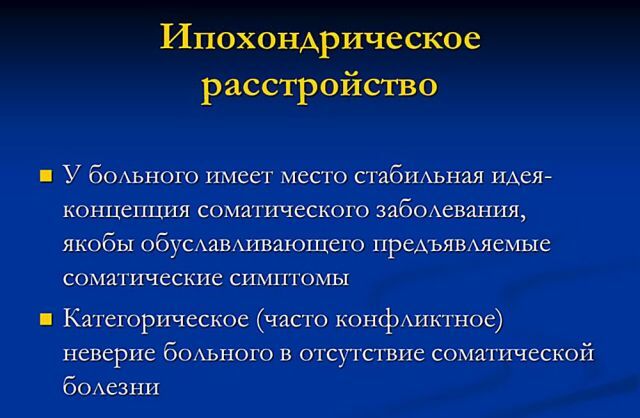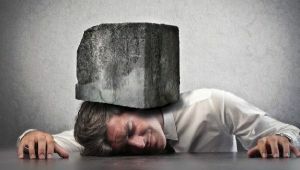 Stress is a response of the human body to various kinds of irritants, regardless of whether it is positive or negative.
Stress is a response of the human body to various kinds of irritants, regardless of whether it is positive or negative.
In the modern world, the number of such stimulus factors is incredibly large, and, with each day, it increases. Accordingly, the load that the human body must withstand is significantly increased.
Stress( stress in translation from English is a state of higher voltage, load).Thus, a person, being in constant tension from frequent stresses can not fully enjoy life, work fruitfully.
Frequent or protracted stressful situations or the action of provocative factors lead to a constant release of stress hormones. So, very frequent consequences of stress:
- heart palpitations;
- increased blood pressure;

- changes in the rhythm of breathing;
- abundant supply of muscles with blood;
- back pain;
- stomach pain;
- sleep disturbance;
- blood circulation disorder;
- addition or weight loss;
- constant "combat readiness" of the body.
These manifestations may be present in a person, or may not be manifested - it all depends on the individual, internal and external factors.
One can respond to the situation extremely susceptibly, and another, as a result of not so strong predisposition, ignore it, but, however, the feeling of tension in any case can not but affect the health of the body.
Positive and negative stress throughout the day can change many times, which leads to the fact that even at night a person can not completely relax, and this already entails the development of various diseases, all of whose symptoms result from the weakening of the immune system as a result of a constantof nervous tension.
Contents
- About the stress hormone
- The use of the stress reaction
- Well in dealing with stress
- What causes stress and stress factors
- Such different and not always dangerous
- The first bells
- The development stages of
- Massive blow to all the systems of the body
- How to get rid of stress -it's all about the mood of
- It's better not to know. ..
About the stress hormone
Speaking of the stress hormone usually means cortisol, as its level rises in the blood even with minor neurasditsah and problems.
As for more serious situations, then two more hormones are activated - norepinephrine and adrenaline. All in a complex they powerfully influence the body, helping to cope with stress. These two hormones intensify, accelerate the rhythm of the heart, provoke an increase in pressure, dilate the pupils, excite the nervous system.
Also due to them there is a disabling of all the organs of the digestive system for a stronger current of blood to the brain. As a result of these processes, the muscles forget about fatigue: brain activity, efficiency, tone and energy rises, the situation is perceived more clearly.
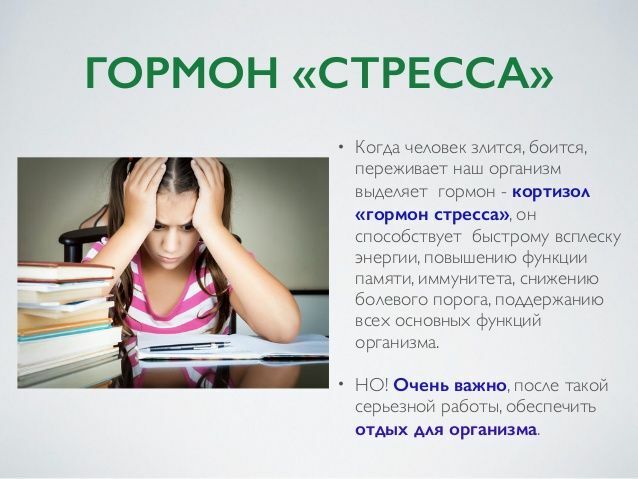
The benefits of a stress reaction
Not always stress is bad. In some situations, he even saved people from death. So, for example, during the training jump with a parachute in August 1967, cosmonaut Alexei Leonov had an emergency situation and when opening the parachute strap he wrapped his legs around the man and clung to the back of the metal. It turned out that the cosmonaut was flying headlong. With such a landing, the fatal outcome was predetermined. But here the role was played by stress.
Thanks to a stressful reaction, the astronaut managed to unbend the metal plate in the air and release the strap. The landing was successful. What is characteristic, after planting the plate tried to return to their former position three people and they did not succeed.
Well in the fight against stress
 According to the famous scientist Allan Lux, a person, doing good deeds, receives an inflow of the hormone of happiness endorphin and other substances that are responsible for positive emotions. As a result of doing good deeds, a person, relaxing, leaves the state of stress. By helping people, a person enters a state that is similar to meditation, and gets rid of stressors.
According to the famous scientist Allan Lux, a person, doing good deeds, receives an inflow of the hormone of happiness endorphin and other substances that are responsible for positive emotions. As a result of doing good deeds, a person, relaxing, leaves the state of stress. By helping people, a person enters a state that is similar to meditation, and gets rid of stressors.
Dean Ornish, according to a thirty-year research of the university, concluded that the women involved in the experiment and helping other people were twice as sick and more satisfied with life.
Based on the research we can conclude: the activity to choose is necessary for the soul and to be not indifferent to strangers - this is the best prevention of stress.
What causes stress and stress factors
Stress can be caused by a number of factors that are conventionally divided into species:
- physical;
- mental.
Physiological causes of stress:
- hypothermia;
- noise;
- blood loss;
- lack of oxygen;
- suffered trauma;
- intoxication of the body
- lack of food;
- excessive physical activity.
Psycho-emotional stressors:
- a touch made unexpectedly;
- loneliness;
- relocation;
- support coming out from under the feet;
- approach or increase in the size of an object with fuzzy characteristics.
The production stresses that have recently taken their place in a person's life include: 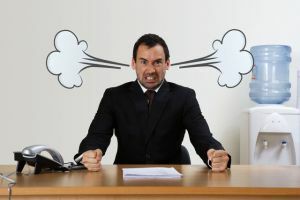
- responsible for people;
- unsatisfactory working conditions;
- problems with superiors;
- overload;
- job assignment, which is difficult to perform;
- an unfair attitude of superiors and an evaluation of the work of workers;
- underload.
In addition, depending on the susceptibility of a person, the following may become the causes:
- material plan problems;
- social isolation;
- difficult situations in life: illness, death of loved ones;
- lack of necessary facilities;
- quarrels with others;
- threat situation;
- uncertainty;
- turning points in life: marriage, divorce, the beginning of the education of children and its end, the birth of a baby, the child's departure from home, a new job, a pension.
Such different and even not always dangerous
In modern medicine these kinds of stress differ:
- Distress adversely affects human life. This type of stress with its harmful effect is characterized by irritability, fatigue, a sense of despair, anxiety, a decline in efficiency. Inability to cope with this situation can lead to a nervous breakdown, exhaustion, mental illness, a psychosomatic disorder.
- Eustress - stress is positive and has the desired effect, mobilizing the body. The processes of memory, self-cognition, cognitive processes, and comprehension of reality are activated.
Also the stress is divided into:
- Acute ( short-term), which is inherent in the unexpectedness and speed with which it begins. The extreme degree of this type of stress is shock. In most cases, acute stress turns into a long-term stress.
- Chronic ( long-term) often occurs against the background of minor factors, acting continuously for a fairly long time.

Also in medical practice stresses are distinguished:
- physiological : the cause is a direct influence of negative factors( pain, cold, hunger, heat, physical overload, etc.);
- psychological is provoked by factors such as threat to life, deception, information overload, insult, etc.;
- emotional can manifest itself in life threatening situations: war, accident, crime, serious illness, etc.;
- information occurs when information is overloaded, in situations where the person in charge does not have the ability to make timely decisions.
The first bells
Stress - an unpleasant and rather dangerous phenomenon, as it can lead to various diseases and protracted depressions, and in order to successfully combat this problem, it is necessary to know the first symptoms of the problem, having felt that it is necessary to start the battle for serenity and bliss.
First symptoms:
- headaches that are regular;
- insomnia;
- severe irritability;
- mood change: which is typical, if a person is usually calm, he becomes quick-tempered, and a quick-tempered person closes in himself.
Stages of development
The main stages of stress, regardless of the factors provocators are divided into three groups:
- stage of anxiety;
- resistance;
- depletion.
The impact of stress on the human body at each stage of its development:
- At the first stage, all the defenses of the body are mobilized. In this case, the sense of is predominant, the adaptive forces of the organism are mobilized. The person concentrates his attention on the factor-stimulus. Gradually, the ability to control one's behavior is lost. If at this stage it was possible to suppress the feeling of anxiety, the stress goes away. If not, the next stage begins.
- The stage of resistance is a continuation of the development of the situation. The person has a "second wind": all the systems of the body
 operate in the maximum mode, respectively, either the person raises his activity and mobilizes all the forces, or he becomes passive and general braking goes on. All this depends on the individual characteristics.
operate in the maximum mode, respectively, either the person raises his activity and mobilizes all the forces, or he becomes passive and general braking goes on. All this depends on the individual characteristics. - If the two stress phases have been passed and the adaptation is not so strong, the is on the desiccation stage of .It comes only as a result of the action of the stress factor for a very long time. At this stage, the body's strengths are depleted. This outcome can lead to a deterioration in the overall health and development of various diseases.
Massive impact on all body systems
Stress is manifested by all organs and systems and its signs can be found almost everywhere:
- Cardiovascular system .The patient may experience blood pressure changes. Hypertension is a frequent phenomenon. A pronounced violation of the heart and tinnitus.
- Digestive system .Decrease or total lack of appetite, characteristic of stress, leads to weight loss. Less common is the opposite effect - increased appetite and weight gain. There may also be abdominal pain, heartburn, nausea, vomiting, belching, stool breaking, heaviness in the stomach.
- Respiratory system .A person in a state of stress can feel lack of oxygen, shortness of breath, inability to take a deep breath, frequent cases of colds.
- Musculoskeletal system .From the musculoskeletal system, muscle spasms, cramps, back pain, muscles in constant tone become more frequent.
- Leather .Skin rashes are possible even in the absence of an allergic reaction.
- The nervous system .There are headaches, general asthenization of the body, a decrease in the body's resistance. Under stress, the temperature often decreases, but up to 37.3 is possible.
- The sexual system .Stress leads to a decrease in libido.
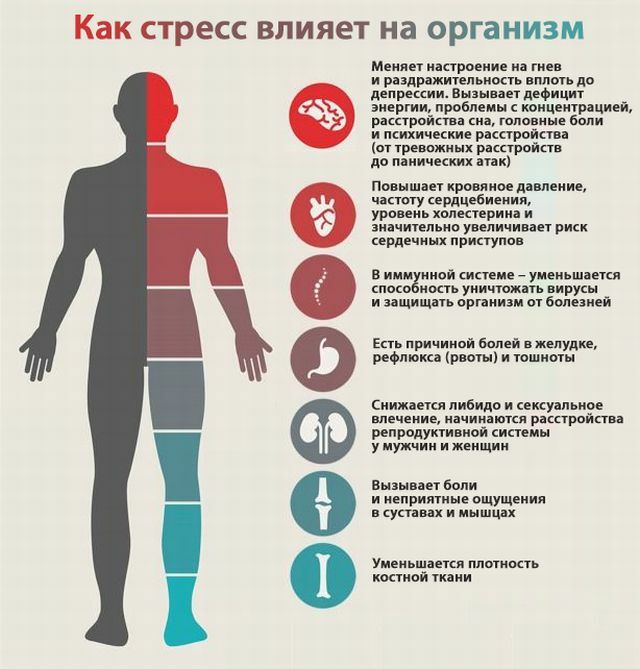
How to get rid of stress - it's all about the attitude of
In order to relieve stress and nervous tension, and also learn how to keep it under control, adhere to the basic rules:
- , go in for sports : effective will be both training on the simulators, and games like basketball,volleyball, etc., as a result of such activities a person becomes balanced, the figure improves, self-esteem rises;
- nervous tension on the limit - pick up the rubber ball and knead it , these actions relax the muscles and relieve tension;
- in most stressful situations it is necessary for to switch its attention and think about something good : romantic journey, family dinner;
- in the diet enter bananas - they contain substances that accelerate the production of serotonin( a hormone of joy), and, accordingly, raise the mood;

- is one of the best methods of combating stress - aromatherapy .Lavender, chamomile will calm your nerves, and orange, basil and anise will drive depression and anxiety;
- among the medications , which will help cope with stress allocate: sedatives( Persen, Corvalol, Novo-Passit) - they have a pronounced soothing effect;antidepressants that will raise the mood;tranquilizers, soothing and relieving stress;nootropics will improve brain activity;Neuroleptics - will help to overcome protracted depression.
9 ways to quickly relieve stress to restore the nervous system after a prolonged overexertion:
Otherwise, the consequences of stress can be sad:
It's better not to know. ..
To prevent stress from becoming a norm, it must be prevented. The most effective methods are:
- caring for pets that distract from daily fuss and problems;
- during the day should be alternated labor of the physical and mental, since monotonous monotonous work in itself is stress;
- lead an active lifestyle;

- more often in the open air;
- sleep should be full, so allocate 8 hours for it( before going to bed, ventilate the room, take a walk, rest in a warm bath and drink a cup of warm tea with melissa and honey);
- study drawing: it will distract from problems and plunge into the world of fantasy;
- solve all existing conflicts: just go to meet people and problematic stressful situations will exhaust themselves;
- read your favorite books;
- meet with people who are pleasant to you;
- meditate is the best way to relax and avoid stress.


